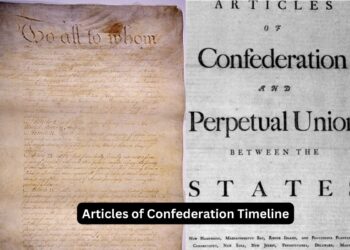“Civil Disobedience” is an essay written by Henry David Thoreau in 1849. It explores the concept of nonviolent resistance and the moral duty of individuals to oppose unjust laws and government actions. Thoreau’s ideas have since influenced many social and political movements around the world.
Civil Disobedience Essay By Henry David Thoreau-Thoreau begins by stating that the government is best which governs least, suggesting that a minimalistic government is preferable. He criticizes the existing system for supporting slavery and waging war against Mexico, which he views as immoral and unjust. Thoreau argues that individuals should prioritize their conscience and moral principles over blind allegiance to the state.
Civil Disobedience Essay By Henry David Thoreau-The essay discusses Thoreau’s personal experience of spending a night in jail for refusing to pay a poll tax as a protest against slavery and the Mexican-American War. He sees his imprisonment as a symbol of the state’s attempt to silence dissent and enforce compliance. Thoreau asserts that it is a person’s moral obligation to disobey unjust laws and refuse to cooperate with an unjust system.
Also Read-
- Where I Lived, and What I Lived For Essay Summary By Henry David Thoreau
- The Superannuated Man Essay Summary By Charles Lamb
- On Going a Journey Essay Summary By William Hazlitt
- Areopagitica Essay Summary By John Milton
Civil Disobedience Essay By Henry David Thoreau-Thoreau emphasizes the power of nonviolent resistance, suggesting that individuals can bring about change by refusing to participate in unjust actions and by expressing their opposition openly.
He advocates for acts of civil disobedience that are peaceful, but disruptive enough to draw attention to the injustice and provoke dialogue and reflection. Thoreau believes that the power of conscience and truth will eventually prevail over unjust laws.
Civil Disobedience Essay By Henry David Thoreau-In summary, “Civil Disobedience” is a philosophical essay that promotes individual moral autonomy and encourages peaceful resistance to unjust laws and government actions. Thoreau’s work has had a significant influence on subsequent movements advocating for social justice, civil rights, and nonviolent protest.
About Henry David Thoreau
Civil Disobedience Essay By Henry David Thoreau-Henry David Thoreau was an American writer, philosopher, and naturalist who lived in the 19th century. Born on July 12, 1817, in Concord, Massachusetts, Thoreau is best known for his works, including the essay “Civil Disobedience” and his book “Walden,” which reflect his philosophical beliefs and deep connection to nature. Thoreau’s writings have had a profound influence on various fields, such as literature, environmentalism, and social activism.
Civil Disobedience Essay By Henry David Thoreau-Thoreau was born into a modest family. His father, John Thoreau, was a pencil manufacturer, and his mother, Cynthia Dunbar, took care of the household. Thoreau’s parents encouraged his education and instilled in him a love for reading and learning. He attended the Concord Academy, where he excelled in his studies, particularly in literature and languages. Later, he enrolled at Harvard College and graduated in 1837.
After completing his education, Thoreau returned to Concord and briefly taught at the Concord Academy. However, he soon decided to pursue a different path. He joined his father’s pencil manufacturing business, but his true passion lay in writing and observing nature. Thoreau began developing his unique philosophical and literary ideas during this time, influenced by transcendentalism—a philosophical and literary movement that emerged in New England in the early 19th century.
Civil Disobedience Essay By Henry David Thoreau-Transcendentalism emphasized individualism, self-reliance, and a deep connection with nature. Thoreau was greatly influenced by the transcendentalist thinkers of his time, such as Ralph Waldo Emerson, who became his mentor and friend. Emerson’s ideas about the inherent goodness of humanity and the importance of intuition and self-reliance resonated strongly with Thoreau, shaping his own philosophical beliefs.
Civil Disobedience Essay By Henry David Thoreau-In 1845, seeking a simpler and more contemplative lifestyle, Thoreau embarked on an experiment that would become the basis for his most famous work, “Walden.” He built a small cabin near Walden Pond, on land owned by Emerson, and lived there for two years, two months, and two days. Thoreau sought to live a life of deliberate simplicity, surrounded by nature, where he could dedicate himself to self-reflection, observation, and writing.
Civil Disobedience Essay By Henry David Thoreau-“Walden; or, Life in the Woods” was published in 1854 and is a reflection on Thoreau’s time at Walden Pond. The book explores themes of self-reliance, individual freedom, and the importance of living in harmony with nature. Thoreau’s writing in “Walden” is characterized by its poetic language, detailed observations of the natural world, and philosophical musings on the meaning of life and the pursuit of truth.
One of the central ideas in “Walden” is the concept of simplicity. Thoreau believed that by simplifying one’s material possessions and daily routines, individuals could gain a deeper understanding of themselves and their relationship with the natural world. He championed the idea that true wealth and fulfillment come from within and are not dependent on material possessions or societal expectations.
Civil Disobedience Essay By Henry David Thoreau-Thoreau’s time at Walden Pond also allowed him to contemplate the role of work in a person’s life. He argued that work should not be seen as a means to accumulate wealth or social status but rather as a means of self-expression and personal fulfillment. Thoreau advocated for a balanced and purposeful approach to work, emphasizing the importance of pursuing meaningful and fulfilling activities.
Conclusion
“Civil Disobedience” by Henry David Thoreau remains a significant and influential essay that raises important questions about the relationship between the individual and the state. Thoreau’s call for individuals to prioritize their conscience and moral principles over blind obedience to unjust laws has resonated with generations of activists and thinkers.
Civil Disobedience Essay By Henry David Thoreau-Thoreau’s ideas have been particularly influential in shaping movements advocating for civil rights, social justice, and nonviolent protest. His emphasis on the power of nonviolent resistance and the potential for individuals to effect change through peaceful means has inspired countless individuals to take a stand against injustice.
While Thoreau’s essay was written in the context of the 19th century, its themes and principles continue to be relevant in the present day. The idea that individuals have a moral duty to resist unjust laws and government actions is a concept that continues to spark debate and inspire activism.
Civil Disobedience Essay By Henry David Thoreau-Overall, “Civil Disobedience” serves as a timeless reminder of the importance of individual conscience, moral autonomy, and peaceful resistance in the face of injustice. It encourages individuals to question and challenge authority, and to strive for a more just and equitable society.
FAQ.
Q: What is civil disobedience?
A: Civil disobedience refers to the deliberate, nonviolent violation of laws or government policies as a form of protest against perceived injustice. It is a means of expressing dissent and challenging the legitimacy of unjust laws or actions through peaceful noncompliance.
Q: What are some examples of civil disobedience?
A: There have been numerous examples of civil disobedience throughout history. Some notable examples include Mahatma Gandhi’s Salt March in India, the civil rights movement in the United States led by figures like Martin Luther King Jr., and the anti-apartheid movement in South Africa led by Nelson Mandela.
Q: How is civil disobedience different from other forms of protest?
A: Civil disobedience is distinct from other forms of protest in that it involves the intentional violation of laws or policies. It is typically characterized by its nonviolent nature, as practitioners seek to highlight injustice without causing harm or resorting to violence.
Q: What are the potential consequences of engaging in civil disobedience?
A: Engaging in civil disobedience can result in legal consequences, such as fines or imprisonment, as individuals intentionally break the law as a form of protest. However, the aim of civil disobedience is often to draw attention to a particular cause or issue, and individuals may be willing to accept the consequences as part of their broader message.
Q: Is civil disobedience always morally justified?
A: The moral justification of civil disobedience is a subject of ongoing debate. Supporters argue that it is a necessary tool for challenging unjust laws and effecting social change. Critics contend that it undermines the rule of law and can lead to a breakdown in societal order. The moral justification of civil disobedience often depends on the specific context, the nature of the injustice being protested, and the extent to which nonviolent means of redress have been exhausted.

















